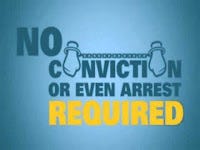The civil forfeiture racket: Citizens are guilty until proven innocent.

Washington, D.C.- In court filings, the Metropolitan Police Department (MPD) claims to have sold over 200 forfeited vehicles at auction in the last three years—and to have returned 16 to 20 vehicles a week to property owners during that time. MPD says it collected $358,000 from civil forfeiture in fiscal year 2011, according to court documents. Over the same period the department received $529,000 from federal equitable sharing, a program in which local law enforcement turns cases over to federal prosecutors.
The feds process the forfeiture and then return 80 percent of the proceeds to the seizing agency. It's a finder's fee of sorts for local cops.
In theory, the government uses asset forfeiture to strip criminal enterprises of resources and “toys”—the cars, planes, boats, and homes that make the illicit life look glamorous. But a glance at the legal notices the department publishes periodically in The Washington Times reveals the city is hardly targeting kingpins. A notice from last September lists these cars: a 1985 Chevrolet, a 1994 BMW, a 1999 Lincoln, a 1994 Lexus, a 1991 Honda, and a 2001 Chevrolet. Most seizures are of cash—generally less than $100 and as little as $7—taken from thousands of people each year.
“Many of these clients don’t have money, don’t have assets, some are innocent,” says criminal defense lawyer Henry Escoto, who is pursuing a class-action lawsuit against the city. “Many times just because police arrest somebody for possession of a controlled substance doesn’t necessarily mean that the money they have on them came from illegal proceeds. It could be many of these guys have jobs and get caught with rent money or their paycheck. That’s pretty significant.”
By law, the MPD must notify property owners of their constitutional right to challenge a forfeiture, but it recently emerged in court that up to 2,000 of the 3,000 property owners who had property seized in 2009 may not have received notice.
Once owners receive notice, they have 30 days to challenge the forfeiture or the District assumes control of the property automatically. To file a challenge, owners must put down a $250 to $2,500 bond, which can exceed the value of the seized items (the MPD assigns a dollar amount based on its estimate of the items' value). But unlike a criminal bond, where owners can get access to their property (or go free) until trial, the civil asset forfeiture bond is actually just a filing fee that initiates litigation. If the owners cannot afford a lawyer, they must conduct a trial, which can last a year, themselves. And the outcome is far from certain because civil forfeiture law presumes guilt—a total inversion of the principle that a suspect is innocent until proven guilty.
Last October, D.C. City Council Chairman Phil Mendelson and Council Member Mary Cheh introduced legislation that would substantially improve protections for property owners. The bill, which has been reintroduced for the 2013 session, would shift the burden of proof to the government, eliminate the bond requirement, and mandate the return of confiscated property if the District fails to provide a hearing before a neutral arbiter within two days of a challenge.
Perhaps most important, the bill would direct all forfeiture proceeds, 100 percent of which currently go to the MPD, into the city’s general fund—regardless of whether the MPD or the federal government handles the case. That’s significant because state laws that do not address the federal equitable program sharing do not eliminate local law enforcement's ability to police for profit. Local police routinely use equitable sharing to evade state laws that limit the share of forfeiture proceeds returned to the seizing agency.
If passed as is, the 2013 bill would provide D.C. residents with some of the best protections in the country and would provide state legislators with a model to follow. A hearing on the bill has yet to be scheduled, but the legislation has the support of eight out of 12 council members.
http://reason.com/archives/2013/01/19/dcs-civil-forfeiture-nightmare
http://ludingtoncitizen.ning.com/forum/topics/civil-asset-forfeiture-why-having-honest-cops-is-important
http://judymorrisreport.blogspot.com/2012/08/civil-asset-forfeiture-governments.html
Asset Forfeiture-Forfeiture procedures in the District of Columbia:
http://www.docstoc.com/docs/23254491/Asset-Forfeiture---PowerPoint
Policing for Profit: The Abuse of Civil Asset Forfeiture.
Civil forfeiture laws represent one of the most serious assaults on private property rights in the nation today. Under civil forfeiture, police and prosecutors can seize your car or other property, sell it and use the proceeds to fund agency budgets—all without so much as charging you with a crime. Unlike criminal forfeiture, where property is taken after its owner has been found guilty in a court of law, with civil forfeiture, owners need not be charged with or convicted of a crime to lose homes, cars, cash or other property.
Americans are supposed to be innocent until proven guilty, but civil forfeiture turns that principle on its head. With civil forfeiture, your property is guilty until you prove it innocent.
Policing for Profit: The Abuse of Civil Asset Forfeiture chronicles how state and federal laws leave innocent property owners vulnerable to forfeiture abuse and encourage law enforcement to take property to boost their budgets. The report finds that by giving law enforcement a direct financial stake in forfeiture efforts, most state and federal laws encourage policing for profit, not justice.
http://www.ij.org/images/pdf_folder/other_pubs/assetforfeituretoemail.pdf


